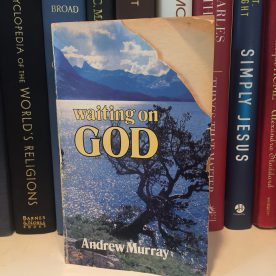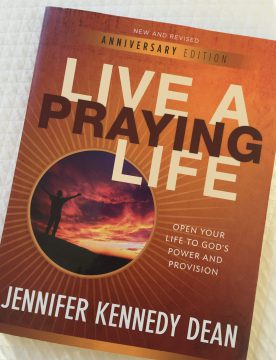So this is officially “Celebrate Your Name” week.
I know this because my hip young friend, Peyton, runs an award-winning marketing firm, and she published a content calendar on her website this week. It’s chock full of things we might not otherwise know.

For instance, if you missed out on “World Compliment Day” on March 1, you can still take advantage of “National Napping Day” next Tuesday. And don’t tell my husband (because he’s currently looking at litters online), but March 23 is “National Puppy Day” (which probably means that my coffee table is about to get chewed).
Anyhow.
When I downloaded Peyton’s calendar and saw the bit about celebrating our names, I thought to myself: That’s kind of freaky. In a freaky good kind of way. Because as timing would have it, I have been thinking a whole lot this week about names. Well, one name, anyway.
I have been thinking about the name Jesus–and, in particular, how we use it in prayer.

You know the drill: We ask God for something, or say grace over a meal, and then (sometimes without even thinking) we tack on a quick “…in Jesus’ name, Amen.” Having spent most of 2019 in the Gospel of John, I think I know where this practice comes from. Over and over again, Jesus tells us to ask in his name:
I will do whatever you ask in my name, so that the Father may be glorified in the Son. You may ask me for anything in my name, and I will do it. (John 14:13-14)
You did not choose me, but I chose you and appointed you so that you might go and bear fruit–fruit that will last–and so that whatever you ask in my name the Father will give you. (John 15:16)
Very truly I tell you, my Father will give you whatever you ask in my name. Until now you have not asked for anything in my name. Ask and you will receive, and your joy will be complete. (John 16:23-24)
Reading verses like these back-to-back, you get the idea that He mean it. Jesus intends for us to know His name–and to use it.
Which, for me, raises a couple of questions.
I know how I’d feel if I gave somebody the use of my name–like, if I recommended someone for a job, or I wanted to make an introduction. I’d want that person to speak and behave honorably (and not to do anything that might, by virtue of my endorsement, reflect badly on me!). Did Jesus, I wondered, ever have that kind of concern?
I wanted to know more about how this “you can use my name” thing really works, and I figured Andrew Murray would have something to say. I picked up my copy of With Christ in the School of Prayer (which is getting more dog-eared by the day) and sure enough: He has a whole chapter on this very topic.

Murray contends that when we pray in Christ’s name, we are actually praying in his nature–which is love. Prayers “in the name of Jesus” presuppose that our interests are aligned with God’s. “No one,” Murray says, “would give another free use of his name without first being assured that his honor and interests were as safe with that other person as with himself.”
Not only that, but the power that our prayers carry also depends on our relationship to the Lord. God looks not just to our lips, but also to our lives to see what His name is to us. And as we “walk in the name of the Lord our God” (Micah 4:5), we can effectively pray in the name of the Lord our God–with full confidence that, as Jesus promised, we will receive whatever we ask.
And finally (and this goes to my question about the potential for misusing Christ’s name), Murray says that the phrase “in my name” has its own built-in safeguard. When we bear the name “Christian”–living and acting and praying as children of God–the power that’s in the name works. When we try to live (and pray) out from under that power, it doesn’t.
Okay. That’s enough Deep Thought for one day. Let’s download our content calendars, thank God for giving us a Name we can celebrate, and look forward to napping next week!
😊
Heavenly Father,
Thank you for giving us the privilege of bearing your name when we call ourselves Christians. Please show us what your name really means, and how we can use it in prayer, so that You will be glorified in our midst. (John 14:13-14)
Amen



























